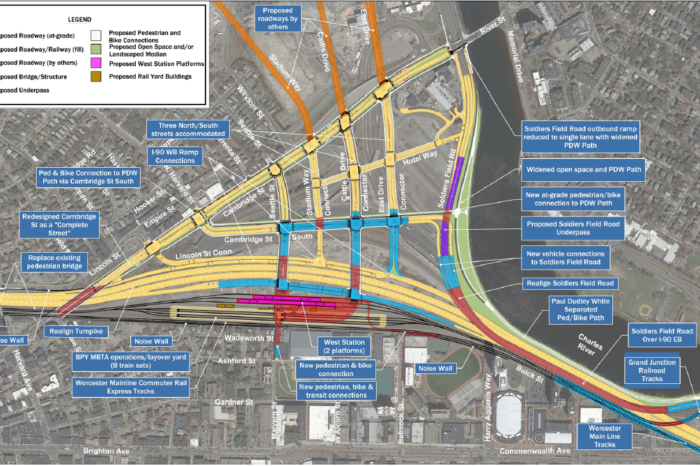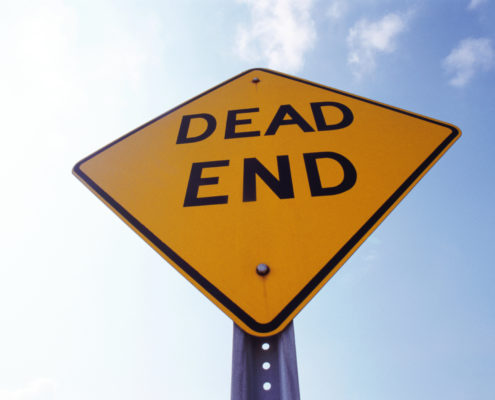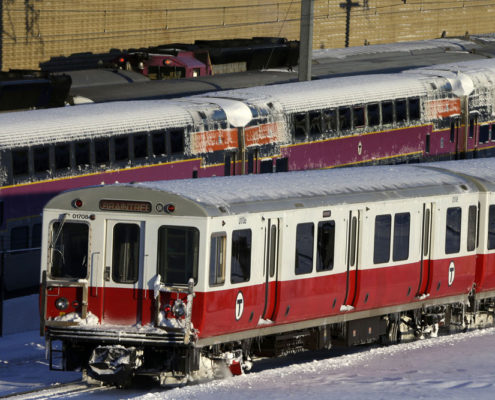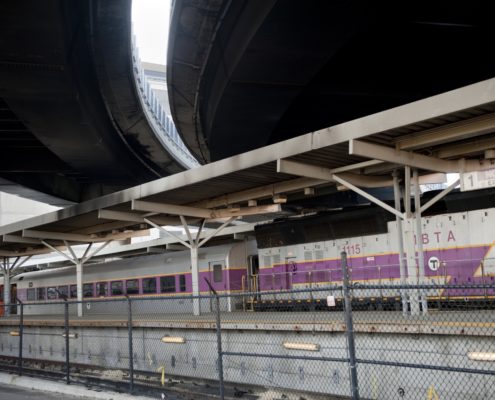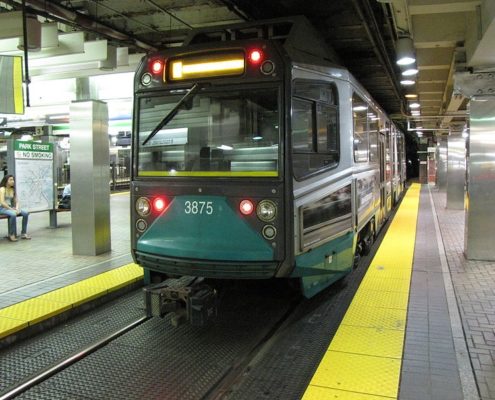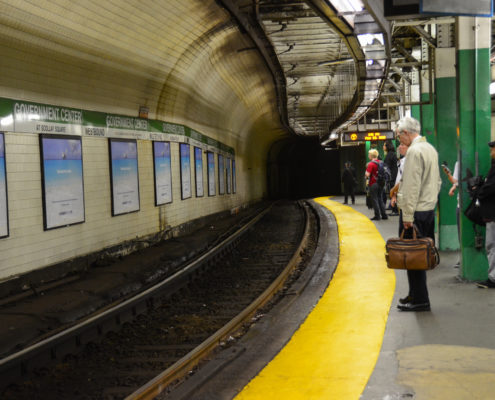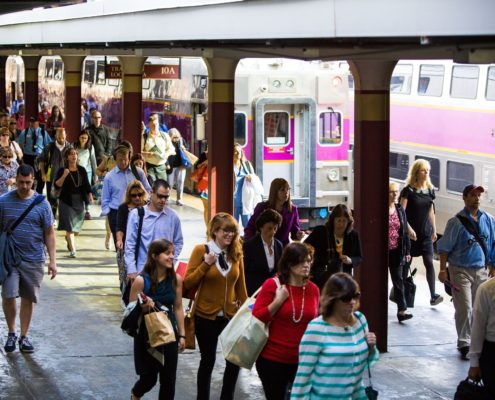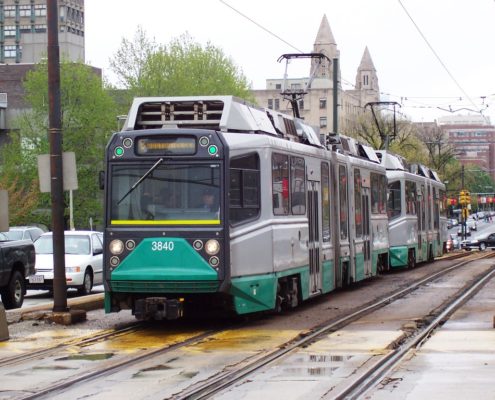Open Letter to MassDOT Board Regarding I-90 Allston Multimodal Project
June 22, 2020
Secretary Stephanie Pollack and Board of Directors
Massachusetts Department of Transportation
Re: I-90 Allston Multimodal Project, Boston, MA National Environmental Policy Act Review Scoping Report: All At-Grade Option and 8-lane Turnpike – Throat Area
Dear Secretary Pollack and Board,
Disruption is far too weak a word for what is coming to Metro-West commuters once the I-90 Allston multi-modal project gets underway in 2022. Long-term lane reductions along the turnpike stretching between Boston University and the Charles River will upend automobile travel to and from Boston.
Commuters, whose lives are going to be uprooted for at least a decade, should get the benefit of seeing cost differentials for both construction and long-term maintenance as well as project durations for alternative infrastructure design options. Therefore, it is in the public’s best interest to consider all at-grade option for the throat area of the I-90 Multimodal Project.
Pioneer Institute recommends that MassDOT revise its Scoping Report. Specifically, we recommend the addition of a modified at-grade option for I-90 and Soldiers Field Road in the throat area that includes the Paul Dudley White bicycle and pedestrian path (PDW) as a bridge over the river 30 to 40 feet from the riverbank. Such an option would provide for parkland with neighborhood access or for the PDW to be positioned just north of Soldiers Field Road over the river’s edge (such positioning may require more narrow travel lanes and shoulders).
Additionally, the Institute
- Strongly advises against a reduction in the number of lanes on the turnpike. The toll-payers will likely be paying for the lion’s share of the project. Their forbearance with the disruptions of the construction period and their bearing the financial burden of paying for the project should not be rewarded with a design that reduces lane capacity below what it currently is.
- Urges MassDOT to maintain options to further improve the turnpike as technologies become available that will reduce congestion or enhance public safety.
- Urges that work on the turnpike structures over route 128 be undertaken before the start of the Allston project in order to avoid concurrent projects and thereby compound traffic woes. Those bridges are about eight years older than the BU viaduct, are also structurally deficient and in dire need of repair.
- Urges that Worcester Line service be ramped up to accommodate greater ridership during the construction period. Framingham and other points west have long endured snarled traffic due to at-grade crossings and increasing service will make traffic in downtown areas more severe. Pioneer recommends that at-grade crossings in the corridor be addressed concurrently with the planning of the I-90 Allston project.
- Supports a traffic study relative of measures and design changes to calm traffic on Soldiers Field Road so that policymakers have the information on the impact of eliminating lane capacity on routine commuters, affected towns, Memorial Drive, secondary roads and other side streets in the area.
Finally, Pioneer Institute recommends that the following additional actions be considered for mitigation:
- Maintain two-track Worcester Line service throughout the construction period
- Begin a pilot project to electrify key areas of the Worcester Line to improve commutes and increase ridership
- River restoration measures should consider co-location of other public benefits such as stormwater mitigation and public access. Due to the project’s close proximity and significant impact on the Charles River and surrounding parklands, river restoration should be a key element of the project.
- End plans for the West Station layover facility to avoid additional traffic on the Worcester Line
- Build platforms for completely level boarding at more commuter rail stations, beginning with Back Bay Station, to reduce dwell time
- Expedite certain proposed design upgrades for Newton’s commuter rail stops to improve access and facilitate faster peak-hour boarding
- Facilitate partnerships among the MBTA, communities, and private firms to increase parking capacity during project construction near the Green Line, Commuter Rail, and bus stations in the I-90 corridor
- Provide transparency on the plan to provide Kendall Square transit access from West Station to benefit commuters from the west
- Where practical, permanently expand station parking lots or consider higher-capacity garages
- Provide MBTA bus service for the I-90 corridor from Park and Ride lots to Boston during construction
- Conduct a feasibility study for improving the Newton Corner exit interchange, addressing design deficiencies of exit ramps and preventing traffic spillover onto I-90
- Encourage pedestrian and bicycle infrastructure improvements near existing Worcester Line and Green Line stations
- Increase MBTA coordination with the MetroWest Regional Transit Authority and the Worcester Regional Transit Authority, including expanded service during construction
- Install electronic speed limit signs that adjust to traffic conditions, maximizing road efficiency
- Create numerous opportunities for western commuters to provide feedback to MassDOT on these mitigation efforts, including public meetings, special web forums, and outreach efforts
- Ensure that residents from MetroWest and Central Massachusetts are represented on the MassDOT board throughout the construction period
- Establish the finance plan for the project in an open and transparent manner and form a finance plan task force with toll payer and other public representation
- Seek extensive federal funding for the project and continue to work with private organizations to help fund the project
Sincerely,
Mary Z. Connaughton, Director of Government Transparency
James Stergios, Executive Director
cc: Jeffrey McEwen, Regional Division Administrator, FHWA
cc: Steve Poftak, MBTA General Manager

